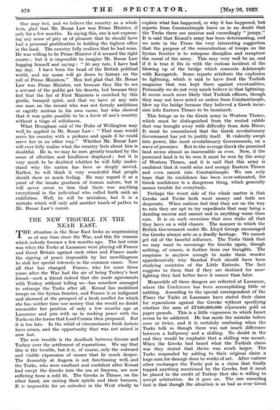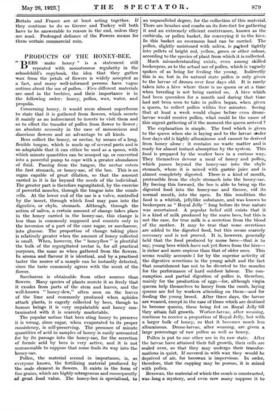THE NEW TROUBLE IN THE NEAR EAST.
rpHE situation in the Near East looks as unpromising 1 as at any time since the War, and this for reasons which nobody foresaw a few months ago. The last crisis was when the Turks at Lausanne were playing off France and Great Britain against each other and France made the signing of peace impossible by her unwillingness to sink her special interests in the common cause. Now all that has changed. France, who for some three years after the War had the air of being Turkey's best friend—such a friend indeed that she made agreements with Turkey without telling us—has somehow managed to estrange the Turks after all Kemal has mobilized troops on the Syrian frontier, and France is so indignant and alarmed at the prospect of a fresh conflict for which she has neither time nor money that she would no doubt reconsider her position of only a few months ago at Lausanne and join with us in making peace with the Turks on the terms that Lord Curzon then proposed. But it is too late. In the whirl of circumstance fresh factors have arisen, and the opportunity that was not seized is now lost.
The new trouble is the deadlock between Greece and Turkey over the settlement of reparations. We say that this is the trouble, but it is, of course, only the outward and visible expression of causes that lie much deeper. The Assembly at Angora is not functioning well, and the Turks, who were exultant and confident after Kemal had swept the Greeks into the sea at Smyrna, are now suffering from a cold fit. The Greeks in Thrace, on the other hand, are raising their spirits and their banners. It is impossible for an onlooker in the West wholly to explain what has happened, or why it has happened, but reports from Constantinople leave us in no doubt that the Turks there are anxious and exceedingly " jumpy," It is said that Kemal's army has been deteriorating, and we note in the Times the very interesting suggestion that the purpose of the concentration of troops on the Syrian frontier is to reimpose discipline and recapture the moral of the army. This may very well be so, and if it is true it fits in with the curious incident of the blowing up of the bridge which connects Adrianople with Karagatch. Some reports attribute the - explosion to lightning, which is- said to have fired the Turkish magazine that was kept there against eventualities. Personally we do more very much believe in that lightning: m It seems much ore likely that Turkish officers, though they may not have acted on orders from Constantinople. blew up the bridge because they believed a Greek incur- sion into Eastern Thrace to be imminent.
This brings us to the Greek army in Western Thrace, which must be distinguished from the routed rabble that was brought away with difficulty from Asia Minor: It must be remembered that the Greek revolutionary Government has yet to justify itself. It violently swept into power, like most revolutionary Governments, on a wave of promises. But to the average Greek the promised land seems almost as inaccessible as ever. Now, if the promised land is to be won it must be won by the army of Western Thrace, and it is said that this army is confident that it could seize and occupy Eastern Thrace and even march into Constantinople. We can only, hope that its confidence has been over-estimated, for Greek confidence is a dangerous thing, which generally means trouble for everybody.
Perhaps the worst side of the whole matter is.. that Greeks and Turks both want money and both are desperate. When nations feel that they are on the way to ruin they are apt to try expedients that may bring a dazzling success and cannot end in anything worse than ruin. It is on such occasions that men stake all that they have on a wild chance. The manner in which the British Government under Mr. Lloyd George encouraged the Greeks always acts as a deadly heritage. We cannot get rid of the baneful influence. The Turks think that we may want to encourage the Greeks again, though nothing, of course, is further from our thoughts. The suspicion is anyhow enough to make them wonder apprehensively why Marshal Foch should have been studying countries of the Little Entente. The fact suggests to them that if they are destined for more fighting they had better have it sooner than later.
Meanwhile all these dangers are reflected at Lausanne, where the Conference has been accomplishing little or nothing. According to the special correspondent of the Times the Turks at Lausanne have stated their claim for reparations against the Greeks without specifying whether the sum of LT160,000,000 represents gold or paper pounds.. This is a little vagueness to which Ismet seems to be addicted. He has made the mistake before once or twice, and it is certainly confusing when the Turks talk as though there was not much difference between a halfpenny and a shilling. No doubt in the end they would be emphatic that a shilling was meant. When the Greeks had heard what the Turkish claim was they stated that theirs was much larger. The Turks responded by adding to their original claim a huge sum for damage done to works of art. After various other exchanges the Turks put in a claim. that finally topped anything mentioned by the Greeks, but• it must be placed to the credit of Turkey that she is willing to accept arbitration. So it goes on. The one consoling fact is that though the situation is as bad as ever Great Britain and France are at least acting together. If they -continue to do so Greece and Turkey will both have to be answerable to reason in the ,end, unless they











































 Previous page
Previous page